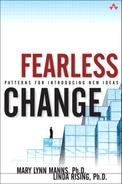Champion Skeptic
Astronomer Carl Sagan said that we need a balance between two conflicting needs—the most skeptical scrutiny of all hypotheses that are served up to us and a great openness to new ideas. If you are only skeptical, then you never learn anything new. You become a crotchety old person convinced that nonsense is ruling the world. (There is, of course, much data to support you.) On the other hand, if you are open to the point of gullibility and have not an ounce of skeptical sense in you, then you cannot distinguish useful ideas from the worthless ones.
Ask for help from strong opinion leaders, who are skeptical of your new idea, to play the role of “official skeptic.” Use their comments to improve your effort, even if you don’t change their minds.
![]()
You are an Evangelist(144) or Dedicated Champion(129) trying to Involve Everyone(173). You are using Fear Less(151) and Bridge-Builder(110) to try to interest skeptics in your new idea.
Some of the resistors to the new idea are strong opinion leaders in your organization.
Skeptics who are both gurus and Connectors(119) know and talk with many people across the organization. If they are vocal about their reluctance to accept your new idea, this will stifle your efforts unless you change their minds, limit their impact, or ask them to help you. The first option may not be possible—you may not be able to bring them to your side. But if they are offered a role in the initiative, they could change from a skeptical outsider to an insider who could make a positive contribution. They do this by bringing a “devil’s advocate” approach to decision making: a solid argument is made and then subjected to grilling by another person or group. Proponents report that it allows only the best plans to survive.
A certain amount of opposition can be beneficial. If there are several strong opinions that provide different points of view, there is likely to be more thought and discussion. As a result, you can work toward a consensus of all the ideas.
Therefore:
Ask for help from a skeptical opinion leader to play the role of “official skeptic” or “official realist.”
Encourage him to point out the problems he sees with the new idea. Invite him to all meetings and presentations, but if he can’t attend, give him an opportunity to talk with you personally. Make sure he understands that his opinions should not stand in the way of progress. Rather, explain that his role is to anticipate problems so that these issues can then be addressed.
Use the information the Champion Skeptic provides. For example, when you talk about the new idea, mention the problems that still need to be tackled so that people know you have a complete view of the new idea. The information can also help set realistic goals that deliver real value.
Just Say Thanks(183) when some point you hadn’t thought of is brought to your attention. It may be your opportunity to be corrected before you make a serious mistake.
Don’t take the idea of Champion Skeptic to extreme. A moderate amount of disagreement is all right, but avoid people with strong personalities who are openly hostile.
If there is more than one skeptic who should be involved, you might consider creating a “Greek Chorus,” a forum where skepticism is featured. This could be a one-time workshop or a group of people who regularly contribute to meetings.
= = = = = = = = =
This pattern creates a relationship with a vocal, influential skeptic who can’t be included in any other way. The invitation to become a Champion Skeptic will encourage the skeptic’s involvement and the opportunity for him to learn more about the innovation. Assigning this role can also feed the skeptic’s ego. Recognizing and validating the ideas of an argumentative person will give him positive reinforcement, and may possibly make it no longer as much fun for him to argue.
If the skeptics are a strong influence in the organization, amplifying their objections could result in the non-adoption of your idea. You must be resilient—be prepared to handle criticism and negative statements.
A couple of people in Dave’s firm are good at “being critical.” Even though they are difficult people to please, they are highly respected throughout the organization. So Dave makes a point of having at least one of these folks on any steering group. He says that they keep him from getting carried away.
When one department has a meeting or discussion, they expect Susan to take the negative side. No matter what she truly believes, she is excellent at playing devil’s advocate. She seems to hate everything, but once she starts to use something she usually likes it. Her initial skepticism but openness in the long run makes her credible. Susan has an important role. Although the team sometimes feels like she is working against them, she keeps them honest in the long run. Without her insights, the other department members might not consider all the possibilities.
